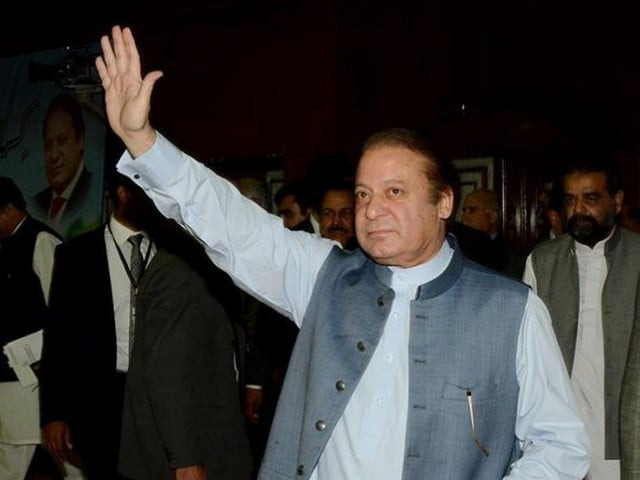SC questions if PM can be disqualified under Article 184
PM's counsel says SC has jurisdiction to disqualify parliamentarians but not the PM on the basis of his speeches

PM Nawaz gestures at supporters. PHOTO: PML-N
“The apex court has jurisdiction to adjudicate such matters under Article 184(3) of the Constitution but can we disqualify someone on the basis of such material or not,” asked Justice Azmat Saeed Sheikh, one of the five judges hearing Panamagate case about offshore businesses of the premier’s family members.
PM’s attorney picks holes in disqualification law
Justice Ejaz Afzal Khan remarked that the court can neither ignore the past nor give judgment which could change the whole scheme of the Constitution.
To this, PM Nawaz’s counsel Makhdoom Ali Khan admitted that the SC has jurisdiction to disqualify parliamentarians but they cannot disqualify the premier on the basis of his speeches under Article 184(3) of the Constitution. “SC does not have jurisdiction to hold an inquiry in this matter,” the counsel said.
Nawaz's counsel contended that the premier had the privilege and his speech in the Parliament could not be adjudicated in the court under Article 66 of the Constitution. Upon this, Judice Ijazul Ahsan expressed wonder that first the prime minister said he did not tell a lie in the Parliament but now he was seeking privilege.
On Friday, the prime minister’s counsel contended before the SC bench that it has yet to be determined which forum is competent to decide qualification or disqualification of a lawmaker for being Sadiq (truthful) and Ameen (trustworthy).
Makhdoom Ali Khan, the attorney for Nawaz Sharif, argued before a five-judge larger bench, headed by Justice Asif Saeed Khosa, that the top court cannot ‘directly’ disqualify his client by invoking Article 62 (1) (f) of the Constitution.
Disqualification of PM to set a dangerous precedent: SC
Last Tuesday, Justice Ejaz Afzal Khan dampened excitement of the PTI’s leadership when he cautioned that a dangerous precedent will be set, if the Supreme Court disqualifies PM Nawaz merely on the basis of his speeches related to the Panama leaks. “We being human make statements. A question arises whether the statements may become a base to disqualify someone – if yes, then it will be a dangerous precedent,” said Justice Ejaz Afzal Khan.
[/fbvideo]



















COMMENTS
Comments are moderated and generally will be posted if they are on-topic and not abusive.
For more information, please see our Comments FAQ